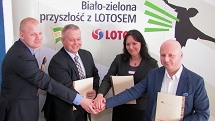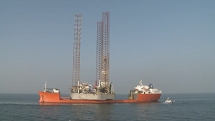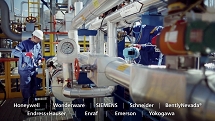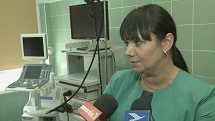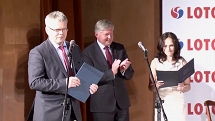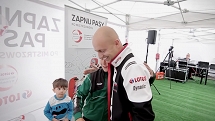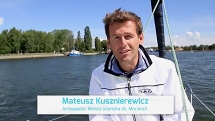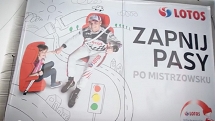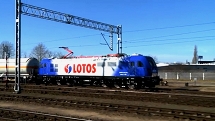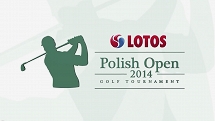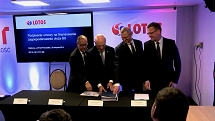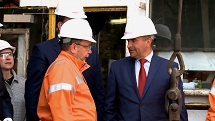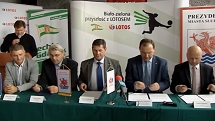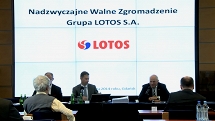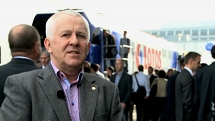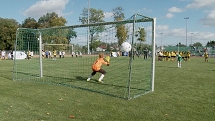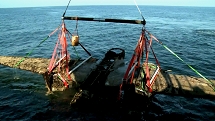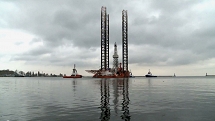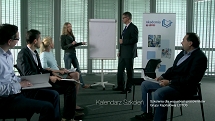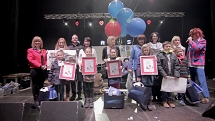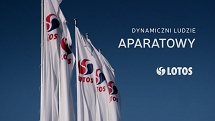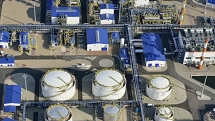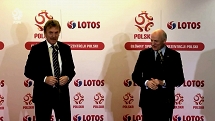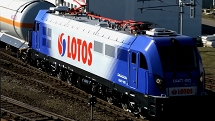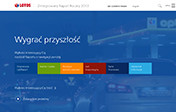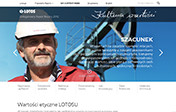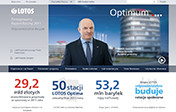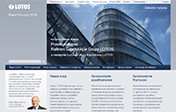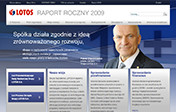-
Financial information
The past year ushered in a series of challenges for the companies in the fuel sector. The decisions made by us have demonstrated that we are able to take rapid steps to adapt to a demanding environment and ensure the desired profitability for our projects.
-
Segment performance
The segmental management model we have implemented enhances management efficiency, delivering cost and revenue synergies across the organization.
-
Letter from the Vice-President of the Board
2014 ushered in a series of challenges for the companies in the fuel sector. The decisions made by the LOTOS Group have demonstrated that we are able to take rapid steps to adapt to a demanding environment and ensure the desired profitability for our projects.
-
Business environment
The key factor that had a strong impact on both the global and Polish petroleum markets in 2014, with significant consequences for the LOTOS Group’s performance, was the price of crude oil, which also determined the price of petroleum products.
-
Strategic objectives
The LOTOS Group’s Strategy is designed to strengthen our position as a strong, innovative and efficient business which plays a major role in ensuring national energy security.
-
Business model
Our operations consist in crude oil production and processing, as well as wholesale and retail sale of petroleum products, among which are: fuels (unleaded gasoline, diesel oil and light fuel oil), heavy fuel oil, bitumens, aviation fuel, naphtha, propane-butane LPG and base oils.
-
Risk and opportunities
At the LOTOS Group, we identify a range of diverse risks, which may affect all areas of our business. The key risks in terms of their impact on our operations are the financial risks as well as risks affecting the exploration and production area. In the analysis of the risks, we also factor in issues related to sustainable development.
-
Key data 2014
With revenue of ca. PLN 28.5bn in 2014, we rank fourth in the group of 500 largest businesses in Poland.

Scope and extent
When choosing what to include in the Annual Report’s chapters devoted to the organization’s non-financial performance, we followed the GRI’s Sustainable Reporting Framework and the IIRC’s integrated reporting guidelines. The Report’s contents were chosen based on the principle of materiality, which is understood as the significance and weight that a given variable has for the operation of a company in accordance with the sustainability principles and for external stakeholders, who expect credible, comparable and reliable information on which to base their decisions.
To determine the expected contents of our Integrated Annual Reports, we organised workshops with the stakeholders who had a key role to play in improving our reporting model, where we identified issues particularly important to the organization and its surroundings.
(1) The Company’s role in the national and regional energy security system
(2) High reliability of production units and installations
(3) Acquisition and development of new production licences
(4) End product quality
(5) New investment projects
(6) Environmental monitoring in the areas where the Company operates
(7) Investment projects compliant with the Best Available Techniques (BAT)
(8) Promotion of the best practices among the supply chain actors
(9) Development of the Ethical Conduct Programme
(10) Development of a public consultation system
(11) Building the value of the LOTOS brand
(12) Implementation of new technologies
(13) Career development opportunities for employees
(14) Fostering appropriate relations with employees
(15) Contributing to social and economic development in the region
In this Report, insofar as it presents our non-financial achievements, we have utilised the majority of GRI core and additional performance indicators covering economic, environmental and social aspects of our business.
As its predecessors, the 2014 Report includes additional indicators from the GRI Oil & Gas Sector Supplement.
For the purpose of calculating the financial data presented in this Report, we have adopted the same methods as in the LOTOS Group’s consolidated financial statements for 2014, which are consistent with the International Financial Accounting Standards effective as at December 31st 2014.
In the vast majority of the subjects discussed, the non-financial information and data presented in this Report relate to the parent, i.e. Grupa LOTOS. However, we have made every effort to also include consolidated data on the LOTOS Group wherever possible. In areas of key importance to social and environmental responsibility, we have also presented data on the Group’s largest companies from the marketing segment and, as the Sector Supplement was used, also on the LOTOS Petrobaltic Group. In every case, relevant information is provided to indicate which LOTOS Group company is referred to.
The largest (both in terms of revenue and headcount) marketing segment companies of the LOTOS Group are taken to be LOTOS Asfalt, LOTOS Kolej, LOTOS Oil, and LOTOS Paliwa. In the LOTOS Petrobaltic Group, the largest exploration and production companies, apart from the parent (Poland-based LOTOS Petrobaltic), are LOTOS Geonafta of Lithuania and LOTOS E&P Norge of Norway. Another important entity of the LOTOS Petrobaltic Group covered by this Report is Energobaltic, whose business includes managing the CHP plant in Władysławowo.
In the reporting period, there were no changes or other important circumstances affecting the Group companies which would influence the overall assessment of the organization in certain aspects or relative to other Polish companies operating in the same industry.
Compared to the previous Report, we have made the following changes in the form and scope of the presented data:
- change in EN3 presentation for LOTOS Petrobaltic: based on production reports, the indicator has been expanded to cover gas consumed by the boiler house at the company’s onshore facility;
- change in EN16 presentation for LOTOS Petrobaltic: emissions reports now only cover the company’s onshore facility;
- exclusion from the EN22 indicator for LOTOS Petrobaltic and LOTOS Geonafta of drilling cuttings and mud, as they are reported through dedicated indicators.
GRI performance indicators are reported by the companies of the LOTOS Group (LOTOS Asfalt, LOTOS Kolej, LOTOS Oil, LOTOS Paliwa) and the LOTOS Petrobaltic Group 2 (LOTOS Petrobaltic, LOTOS Geonafta, LOTOS E&P Norge, Energobaltic)
| GRI aspects | GRI indicators reported in 2012 | Subsidiaries |
|---|---|---|
| Products and services | EN26 | LOTOS Asfalt, LOTOS Kolej, LOTOS Oil, LOTOS Paliwa, LOTOS Petrobaltic |
| EN27 | LOTOS Asfalt, LOTOS Oil, LOTOS Paliwa | |
| Transport | EN29 | LOTOS Asfalt, LOTOS Kolej, LOTOS Oil, LOTOS Paliwa, LOTOS Petrobaltic (Group) |
| Customer health and safety | PR1 | LOTOS Asfalt, LOTOS Kolej, LOTOS Oil, LOTOS Paliwa |
| Process safety | OG13 | LOTOS Asfalt, LOTOS Kolej, LOTOS Oil, LOTOS Paliwa, LOTOS Petrobaltic |
| Product and service labelling | PR3, PR5 | LOTOS Asfalt, LOTOS Kolej, LOTOS Oil, LOTOS Paliwa |
| Marketing communications | PR6 | LOTOS Oil, LOTOS Paliwa |
| PR7 | LOTOS Asfalt, LOTOS Kolej, LOTOS Oil, LOTOS Paliwa | |
| Customer privacy | PR8 | LOTOS Asfalt, LOTOS Kolej, LOTOS Oil, LOTOS Paliwa |
| Compliance | PR2, PR4, PR9 | LOTOS Asfalt, LOTOS Oil, LOTOS Paliwa, LOTOS Kolej |
| Biodiversity | EN11, EN12, EN13, EN14, OG4 | LOTOS Asfalt, LOTOS Oil, LOTOS Paliwa, LOTOS Petrobaltic |
| Emissions, effluents, and waste | EN16, EN17, EN18, EN19, EN20, EN21, EN22, EN23, OG5, OG7 | LOTOS Petrobaltic (Group) |
| Indirect economic impacts | EC9 | LOTOS Asfalt, LOTOS Kolej, LOTOS Oil, LOTOS Paliwa, LOTOS Petrobaltic, LOTOS Geonafta |
| Local community | OG11 | LOTOS Petrobaltic (Group) |
| Reserves | OG1 | LOTOS Petrobaltic (Group) |
| Materials | EN1 | LOTOS Petrobaltic (Group) |
| Energy | EN3, EN4 | LOTOS Petrobaltic (Group) |
| Water | EN8, EN9 | LOTOS Petrobaltic (Group) |
| Market presence | EC5, EC6, EC7 | LOTOS Asfalt, LOTOS Kolej, LOTOS Oil, LOTOS Paliwa, LOTOS Petrobaltic (Group) |
| Employment | LA1, LA2, LA8, LA13, LA14 | LOTOS Asfalt, LOTOS Kolej, LOTOS Oil, LOTOS Petrobaltic (Group), LOTOS-Air BP Polska |
| LA1, LA2, LA8 | LOTOS Paliwa | |
| Human rights | HR1, HR2 | LOTOS Asfalt, LOTOS Kolej, LOTOS Oil, LOTOS Paliwa, LOTOS Petrobaltic (Group) |
2 Where the performance of all companies of the LOTOS Petrobaltic Group is reported, the phrase ‘LOTOS Petrobaltic (Group)’ is used, and where a specific indicator is only reported by some companies, names of the relevant companies are given.
A total of 87 GRI indicators were covered in the 2014 Annual Report. We resolved not to report 9 indicators – core indicators HR5, HR9, HR10, HR11, EN2, OG2, OG3, OG9 and additional indicator HR6 – as they are not relevant in the context of our operations.
For an index of specific performance indicators and descriptions of relevant matters, see the GRI content and UN Global Compact table in the ‘Useful information’ chapter of this Report. (See more)






